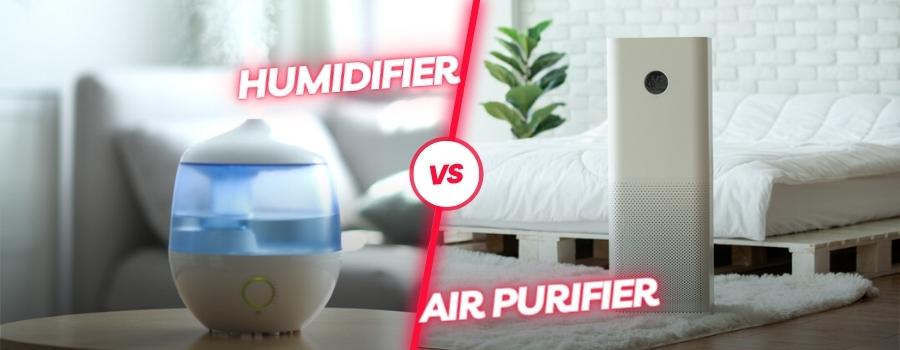If you want to improve the air quality of your home, office, bedroom, or any enclosed environment, then you might be stuck on the decision of air purifier vs humidifier, and since both devices may seem to perform the same functions, it can be tough to choose between the two. So, what we will do in this post is walk you through the difference between an air purifier and a humidifier, how they impact your health, and how to choose between both.
To understand the difference between both, let’s start by defining each and what they do, then we can summarize their differences.
What is an Air Purifier and How Does it Work?
Just as the name suggests, an air purifier is a device that purifies the air of the surrounding environment by eliminating pollutants such as mold, pet dander, allergens, and dust from the air.
There are two ways air purifiers work:
- By Filtration (Filter-based Air Purifiers)
- By Radiation
1. Filter-based Air Purifiers:
The idea behind this technology is that the air purifier draws air to itself through its internal fan and then passes the sucked-in air through a filter to get rid of the pollutants present in the air. Once the air is filtered, the filtered air is then pushed back into the indoor environment for breathing. There are two major types of filter-based air purifiers:
- HEPA filter air purifiers
- Activated Carbon air purifiers.
HEPA Filters:
HEPA filter air purifiers use a High-Efficiency Particulate Air (HEPA) filter to get rid of air pollutants. These filters are capable of eliminating pollutants that have sizes of up to 0.3 microns, and it is capable of getting rid of 99.9% of pollutants of that size such as dust, allergens, mold spores, bacteria, and pollen.
Activated Carbon Air Purifier:
This type of air purifier uses a porous activated carbon filter to get rid of pollutants with sizes between 0.5 to 50 microns. This means an activated carbon air purifier can adsorb much larger particles than a HEPA filter purifier can. Some pollutants an activated carbon filter can help you get rid of include VOCs, gaseous particles, and paints.
2. Radiation-based Air Purifiers:
These types of air purifiers emit certain radiations which negate the energy of the pollutants, making the pollutants harmless. There are two types of radiation-based air purifiers:
- Ionizers Purifiers
- UV Purifiers
Ionizer Purifiers:
These types of air purifiers purify the air by emitting negatively charged ions. Since most air pollutants are positively charged, the negative ions from the ionizer will attach themselves to the positively-charged air pollutants, neutralizing their effect and causing them to fall on surfaces such as walls, floors, or ceilings, as opposed to floating in the air.
Once the neutralized pollutants fall on the surface, you can then clean them up to get rid of them. Ionizers can get rid of pollutants such as mold, and microorganisms; however, ionizers aren’t effective at removing large pollutants such as pollens, allergens, and VOCs.
UV-Light Purifiers:
UV purifiers work by radiating UV light from their UV lamp onto the surrounding environment to deactivate airborne pollutants. The type of radiation emitted by UV light purifiers is known as germicidal radiation. The intensity of the germicidal UV radiation is capable of destroying viruses, bacteria, molds, and allergens. Some UV air purifiers come with a catalyst that can help the purifier destroy gaseous pollutants as well.
What is A Humidifier and How Does it Work?
A humidifier is a device that increases the water vapor concentration or moisture content of the air in an enclosed space. A humidifier works by releasing water vapor into the atmosphere of the surrounding environment, causing the atmosphere to be moist rather than dry. Or simply put, a humidifier increases the humidity levels of a room.
The are two types of humidifiers and the way a humidifier works will depend on the type of humidifier you purchase; let’s take a look at each to understand how they work
1. Warm Mist Humidifier:
This type of humidifier moistens the surrounding air by releasing warm water vapor into the air. These types of humidifiers pass the water through a heating system at the base to vaporize the water and then it pushes the vapor into the environment. Warm mist humidifiers tend to be quiet.
2. Cool Mist Humidifier:
Cool mist humidifiers work by releasing room-temperature vapor into the surrounding environment. This type of humidifier uses ultrasonic technology to convert the air to mist and then uses a fan to push the vapor into the environment. Due to the presence of a fan, cool mist humidifiers tend to be louder than warm mist humidifiers; however, due to the absence of heating elements, they make a great choice for children’s rooms and that of older folks.
So, what's the difference between both?
When it comes to the difference between humidifiers and air purifiers, the difference is that a humidifier increases the moisture content of the surrounding environment while a purifier gets rid of airborne pollutants.
How Do Air purifiers and Humidifiers Impact Your Health?
Air purifiers and humidifiers affect your health in different ways, let’s take a look at each:
How Air Humidifiers Affect Your Health:
First off, we would like to point out that humidifiers are ideal for people that live in dry climates or during seasons such as winter/harmattan when the atmosphere is dry.
As stated earlier humidifiers work by increasing the moisture content of the surrounding environment, and this is crucial because when the air is dry, moisture moves from our body into the environment. This affects our health in three main ways:
- Our Skin dries up: This is due to the quick evaporation of moisture from your body to the environment. This can lead to itchiness, wrinkles, dry lips, itchy eyes, and many others.
- Exacerbates infections: When the air is dry, our skin dries up, our mucus membrane dries up, and our eyes dry up as well. These three body parts are the most common ways through which pathogens can enter our body, and they need to be moistened to prevent external pathogens from invading our bodies. Due to these body parts drying up, when allergens and other pathogens from the environment fall on any of these body parts, they can easily penetrate the body causing various infections and health implications such as flu, cold, other respiratory infections, acne, and many others.
- Nasal Congestion: When we breathe in dry air, our nasal cavity dries up, and this inhibits the fluidity of mucus around the sinuses, and as result, mucus builds up in our sinuses leading to nasal congestion, difficulty in breathing, sinusitis, and many more.
The point we are trying to make here is that with a humidifier you will be able to prevent your body from losing water rapidly and also, moisten the air you breathe; hence, preventing the above-mentioned health implications and many others.
How Does an Air Purifier Affect Your Health?
Air purifiers affect our health by attacking pathogens and pollutants that could cause infection in our bodies. Air purifier doesn’t affect the moisture content of the surrounding atmosphere; it just ensures that you breathe in clean air.
Using both an air purifier and a humidifier together, especially during the winter can be very beneficial to your health. This is because the air purifier will decrease the number of pollutants that could have caused irritations and infections, while the humidifier will increase the amount of water vapor in the atmosphere enabling you to breathe better and feel comfortable in your room.
For babies, both an air purifier and a humidifier should work. This is because you want to ensure that during dry seasons, your baby isn’t only breathing moist air but clean air as well.
If you are looking to deal with only allergens, then we recommend that you get an air purifier. For allergens, we recommend you get a HEPA filter purifier.
Getting an air purifier is more effective at dealing with asthma than a humidifier. This is because the air purifier will get rid of allergens that are capable of triggering your asthma when inhaled. Humidifiers can also help with asthma by making your breathing easier; however, asthma will only be triggered when pollutants get into the lung’s airways.
For sinuses, a humidifier will be ideal. This is because when the air is moist and you breathe it in, your nasal cavity will not dry up, and as a result, mucus can flow freely without any build-up in the sinuses.
So, Which Do I Choose?
If you are still confused as to which one to choose, then this summary should help
- If you live in a dusty or air-polluted city or area, but then have normal indoor humidity levels, then you might want to get an air purifier.
- If you live in an area with little to no air pollution, but then you have low indoor humidity levels, then you might want to get a humidifier.
- Finally, if you live in an area that is air polluted and you have low indoor humidity levels, then you can get both.
Conclusion:
Both humidifiers and air purifiers are great for your health; however, the main difference between the two are:
- Purifiers remove pathogens and pollutants, while humidifiers add moisture.
- Purifiers can be used year-round, while it is advised that you use humidifiers only when humidity levels drop or during dry and cold seasons.
- Humidifiers produce water vapor, while purifiers produce clean air.
That being said, both devices are great at improving your indoor air quality. We highly recommend that you use both if you can afford it; however, you might have to switch between a humidifier and a dehumidifier depending on the humidity levels in your room or home.
Finally, we hope the debate on air purifiers vs humidifiers has been settled and you can now make a decision as to how they differ and which one to choose.






